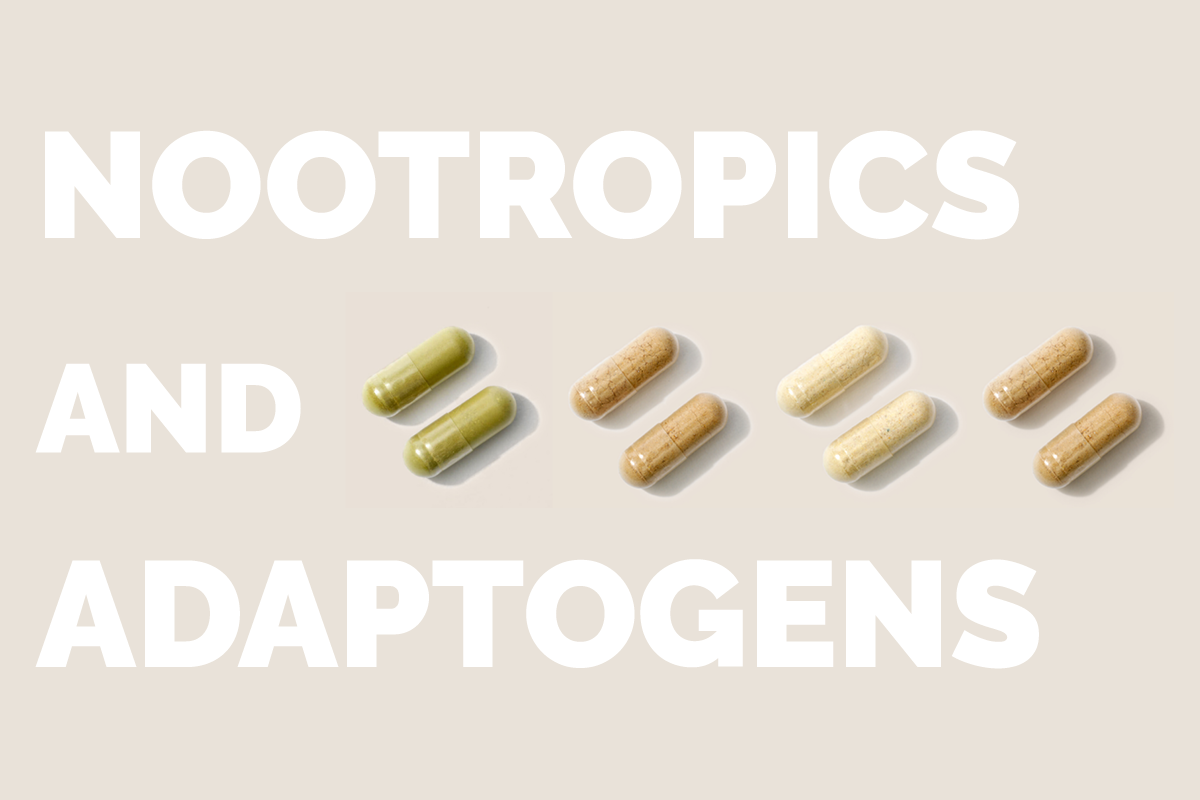Wellbeing and performance have soared in popularity in recent years. Everyone and their brother is into meditation, detoxing and performance enhancing. But did you know that your nutrition can also have just as impactful an effect on your mind? Enter nootropics and adaptogens. Are they worth the hype? Short answer: yes. We're here to explain why.
What are nootropics?
Nootropics are substances that improve cognitive function, in particular relating to focus, creativity, memory, and information recall. Some nootropics will already feature regularly in your diet (for example L-theanine, the stress reducing amino acid found in tea), whilst others you'll probably need to search a little further afield to get hold of (you mean pine bark isn't already part of your diet...?).
Nootropics exist in both synthetic (manmade, e.g. adderall) and natural (i.e. found in nature) forms, and both can have positive effects on your mental functioning. However, natural nootropics are more widely researched in terms of long-term effects and safety.
What are adaptogens?
Adaptogens are herbs and roots that support your body in handling mental and physical stress. Many substances, such as Siberian ginseng, can be considered nootropic as well as adaptogenic, and the terms are often used interchangeably.
What are some examples?
Natural nootropics and adaptogens are typically derived from plants or fungi. Here's a small selection that we use across some of our products:
- L-theanine. A naturally occurring amino acid found in tea leaves. Studies have shown it to effectively induce feelings of calm, without causing drowsiness. Found in The Relax Capsules and The Tone Capsules.
- Rhodiola rosea. An adaptogenic flowering plant that helps your body handle stress more easily. Also proven to boost mental processing and improve attention span. Found in The Focus Capsules and The Fit Protein.
- Lion's mane mushroom. An edible and medicinal mushroom known for its ability to boost mood and reduce anxiety. Found in The Relax Capsules.
- Siberian ginseng. A small shrub that has been used in traditional Chinese medicine for thousands of years. Helps to improve mood, reduce adrenal fatigue and improve memory and learning capacity. Found in The Focus Capsules.
- Maca. A root vegetable, related to the radish. Boosts mood and regulates stress hormones. Found in The Detox Booster, The Recover Capsules, The Fit Protein and The Energy Booster.
- Creatine. Whilst usually consumed for its physical benefits, this organic compound also supports mental function, by ensuring your brain cells have a steady supply of energy. Found in The Power Booster and The Strong Protein.
How do they work?
Different nootropics affect the brain in different ways, from enhancing neurogenesis to improving cerebral circulation and neuron activity. Generally speaking, nootropics can provide the brain with the conditions required to work at its maximum potential, meaning neural responses are accelerated and neurotransmitters are optimally balanced.
Adaptogens respond to your body's mental and physical reactions to stress (particularly your hormone levels) and work to balance these out to a neutral state of 'calm' again.
Typically, the more you get of these natural ingredients in your diet, the more you'll experience their positive effects, as they often have a compounding effect that means the changes they encourage become more noticeable over time.
Studies into the effectiveness of nootropics and adaptogens
Research into both nootropics and adaptogens: particularly when it comes to nootropics for stress and various adaptogen benefits. We've broken this section down into two so you can see and compare the differences.
- Research into Nootropics
Often referred to as 'smart drugs', its no surprise that the world of nootropics is a fascinating one for researchers across the world. Investigating the impact and effectiveness of nootropics and their cognitive functions, many bodies of research have conducted investigations into these fantastic ingredients.
One study published in the Journal of Experimental Pharmacology conducted a systematic review into the literature that surrounds nootropics and their impact on the brain. The research was conclusive, identifying that the supplementation of nootropics play a significant role in the improvement of cognitive functioning, and especially in the recovery of brain injury.
- Research into Adaptogens
When it comes to understanding adaptogens, their uses and benefits, one of the best (and most trustworthy) ways to do this is to turn to research, with many studies proving that the implementation of adaptogens into the diet can have huge impact when it comes to suppressing the impact of stress.
One study, published in the Pharmaceuticals journal supported the suggestion that adaptogens can be used in the treatment of age-related disorders, post-surgery recovery and of course, stress-related disorders.
How do I take nootropics and adaptogens?
Leave it to Innermost. All of our products contain nootropics and adaptogens to specifically enhance physical and mental function in different ways.
Check out our full range of products here, each developed to optimise your body and sharpen your mind in different ways.
References
- Colucci, L., Bosco, M., Ziello, A. R., Rea, R., Amenta, F., & Fasanaro, A. M. (2012). Effectiveness of nootropic drugs with cholinergic activity in treatment of cognitive deficit: a review. Journal of experimental pharmacology, 4, 163. Click here.
- Panossian, A., & Wikman, G. (2010). Effects of adaptogens on the central nervous system and the molecular mechanisms associated with their stress—protective activity. Pharmaceuticals, 3(1), 188-224. Click here.
















